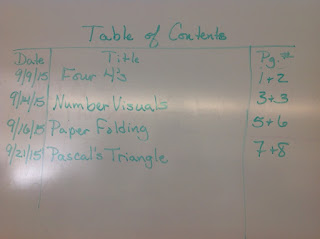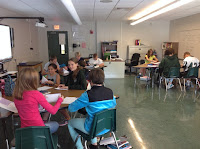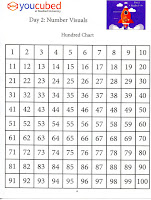We continued work with choosing effective methods to solving problems. This will be completed by tomorrow.
This Blog represents our work in "Math on Team Vista." A daily class summary or lesson will be posted with updated information. A separate page outlines George Polya's Problem Solving Strategies. A last section, "Blizzard Bag," is open only during the winter months. Stayed Tuned!
September 30, 2015
September 29, 2015
Practice with Problem Solving Methods
We began with reviewing Polya's Step 2: Devise a Plan. Students were given a handout to tape into the inside back cover of their MTN's with a list possible suggestions. Then in partner groups, students worked on a set of 10 challenging problems. Students needed to identify the method that would help them solve the question, then attempt to apply the plan while following Polya's Strategies. Work will continue tomorrow to complete these tasks.
HOMEWORK: No new homework tonight (only make up for those who did not complete last night's hw).
Polya: Devise a Plan (Solving Methods)
Polya
mentioned that there are many reasonable ways to solve problems. Your ability
with choosing the appropriate method improves with practice. Here is a partial
list of methods:
· Guess and check (Trial & error)
· Look for a pattern
· Make an orderly list
· Draw a picture or use a model
· Eliminate possibilities
· Solve a simpler problem
· Work backwards
· Use direct reasoning (Logical
deduction)
· Use a formula
· Solve an equation
· Be ingenious
HOMEWORK: No new homework tonight (only make up for those who did not complete last night's hw).
September 28, 2015
Problem Solving -- Growing Shapes, part 2
Today, students were able to share their examples of how the block towers grew in size. There was some drawing, but large wooden blocks also became useful. Then we took a look at the growth pattern in a table and suddenly, students became aware of the number pattern and could solve solutions for a nth.
HOMEWORK: Answer the reflection question in MTN.
HOMEWORK: Answer the reflection question in MTN.
September 24, 2015
Problem Solving -- Growing Shapes
In this problem solving activity, students were instructed to look at the growing cases and describe how they saw the shapes growing. After some struggle and brainstorming, students shared some of their idea(s) and gave the growth a name. A little more time will be given on Monday to complete this lab. We will then use this concrete example to investigate both the number pattern and constructing a table which then leads to writing algebraic expressions.
Students were given 10 minutes to answer 3 review questions about the four previous math labs.
There is no homework for tonight.
Students were given 10 minutes to answer 3 review questions about the four previous math labs.
There is no homework for tonight.
September 23, 2015
Organization of MTN's
Due to shorter classes that resulted from the delayed opening, we spent time updating and organizing papers in individual MTN's.
Homework for tonight is to read over all pages in MTN from 9/9/15 to 9/21/15. Tomorrow, you will be given a 1/2 sheet of paper to answer questions about the four math labs.
This is also a good time to go to the BB Display page of this blog.
Homework for tonight is to read over all pages in MTN from 9/9/15 to 9/21/15. Tomorrow, you will be given a 1/2 sheet of paper to answer questions about the four math labs.
This is also a good time to go to the BB Display page of this blog.
September 22, 2015
Problem Solving -- Pascal's Part 2
After reviewing last night's homework, students were given time to finish up their investigations and answering the questions about Pascal's Triangle. Then partners presented their findings to the rest of the class.
I urge students to use their new knowledge to tackle some investigations from the photos on the BB Display (see the page tab).
There is no homework tonight.
I urge students to use their new knowledge to tackle some investigations from the photos on the BB Display (see the page tab).
There is no homework tonight.
September 21, 2015
Problem Solving -- Pascal's Triangle
After viewing a short video about patterns, students were introduced to Pascal's Triangle. By observing the patterns, they first filled in the missing numbers in partner groups and then answered some additional questions. Partners will share their observations with classmates tomorrow.
****Students do have a homework assignment tonight! It is located in their MTN.
Here is a copy of TOC thus far:
****Students do have a homework assignment tonight! It is located in their MTN.
Here is a copy of TOC thus far:
September 16, 2015
Problem Solving -- Paper Folding
The first part of today's lesson required partners to share two roles ("convincer" and "skeptic") and at the same time were required to follow a set of specified directions. The construction activities required students to review and verify some mathematics terms such as: area and congruent.
Half way through the Paper Folding activity, students were instructed to stop their constructions while I conducted a "Dot Card" activity. This interruption allowed students to think of something else for a while their subconscious was still tinkering with the first problem. The Dot Card activity demonstrated to students as to how interesting and important it is for people to "see" things differently.
Half way through the Paper Folding activity, students were instructed to stop their constructions while I conducted a "Dot Card" activity. This interruption allowed students to think of something else for a while their subconscious was still tinkering with the first problem. The Dot Card activity demonstrated to students as to how interesting and important it is for people to "see" things differently.
September 15, 2015
Number Visuals -- Part 2
Today was a follow-up from Monday's Number Visuals. Here is a copy of the two worksheets given to each partner:
Students were given 20 minutes and again, each pair shared one observation with the rest of the class.
Papers were collected and students were given a copy of the class's Four-4's results and "tested" as to whether or not all expressions matched the value.
See you tomorrow.
Students were given 20 minutes and again, each pair shared one observation with the rest of the class.
Papers were collected and students were given a copy of the class's Four-4's results and "tested" as to whether or not all expressions matched the value.
See you tomorrow.
September 14, 2015
Problem Solving -- Number Visuals
***Tomorrow I will be absent from school. Students will work on a follow-up activity to today's work. In addition to the follow-up activity, students will be given a portrait copy of the class' Four 4's final solution work from last week. The table groups will verify as to whether or not the expressions truly match the desired solution (from 1-20). All plans were shared with students in classes today. A blog is "scheduled" to show after 8AM tomorrow for your review.
These are today's worksheets:
September 9, 2015
Problem Solving -- Four 4's
In today's problem solving activity, students wrote expressions for the values of 1 to 20 using only four 4's -- all four of them needed to be used each time. First, a list of possible operations were created in class. I gave students a head start by giving an example. Students worked in groups of four (interestingly, we have four groups of four). As groups discovered possible solutions, a member from each group would go up to the board and write their group's solution. This continued until all numbers 1 - 20 were filled. If students noticed any errors -- they were not allowed to erase another group's response. All will be used as discussion points at our next meeting.
Here are some notes from the board prior to group work:
Here are some notes from the board prior to group work:
Responses from individual classes:
 |
| Aquila |
 |
| Perseus |
 |
| Andromeda |
September 8, 2015
Welcome Back!
Today, was our opening day to 7th and 8th grade math on Team Vista. The students and I were engaged in a number of activities:
1. The introduction to an interactive bulletin board display titled, "What's/Where's the Math?" Ask the students about this.
2. We set up MTN's (Math Thinking Notebook) with the Table of Contents.
3. Taped Polya's Strategies to problem solving on the inside cover to MTN's (interestingly can be used for more than math).
4. Introduction to Week of Inspirational Math; a 5-day problem solving series that focuses on ". . . inspiring students through open, beautiful and creative math. [The staff at Stamford University, under the direction of Professor JoBoaler have] . . chosen the different tasks so that students see math as a broad, interesting and visual subject that involves deep thinking."
5. The first lesson, Honoring Ideas: Wanted: Everyone’s! will take place tomorrow.
1. The introduction to an interactive bulletin board display titled, "What's/Where's the Math?" Ask the students about this.
2. We set up MTN's (Math Thinking Notebook) with the Table of Contents.
3. Taped Polya's Strategies to problem solving on the inside cover to MTN's (interestingly can be used for more than math).
4. Introduction to Week of Inspirational Math; a 5-day problem solving series that focuses on ". . . inspiring students through open, beautiful and creative math. [The staff at Stamford University, under the direction of Professor JoBoaler have] . . chosen the different tasks so that students see math as a broad, interesting and visual subject that involves deep thinking."
5. The first lesson, Honoring Ideas: Wanted: Everyone’s! will take place tomorrow.
Subscribe to:
Comments (Atom)














